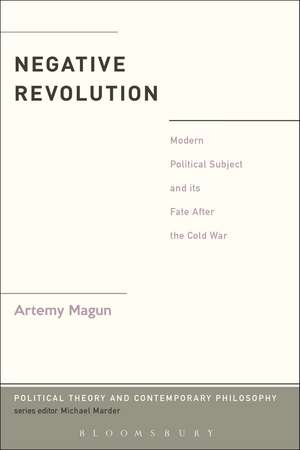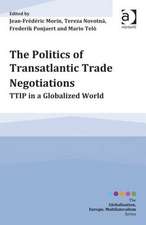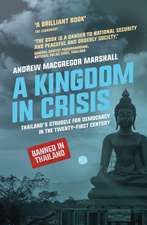Negative Revolution: Modern Political Subject and its Fate After the Cold War: Political Theory and Contemporary Philosophy
Autor Dr. Artemy Magunen Limba Engleză Paperback – 18 dec 2013
| Toate formatele și edițiile | Preț | Express |
|---|---|---|
| Paperback (1) | 239.59 lei 6-8 săpt. | |
| Bloomsbury Publishing – 18 dec 2013 | 239.59 lei 6-8 săpt. | |
| Hardback (1) | 833.06 lei 6-8 săpt. | |
| Bloomsbury Publishing – 18 dec 2013 | 833.06 lei 6-8 săpt. |
Din seria Political Theory and Contemporary Philosophy
- 14%
 Preț: 192.73 lei
Preț: 192.73 lei - 23%
 Preț: 191.13 lei
Preț: 191.13 lei - 30%
 Preț: 540.80 lei
Preț: 540.80 lei -
 Preț: 190.96 lei
Preț: 190.96 lei - 13%
 Preț: 237.75 lei
Preț: 237.75 lei - 13%
 Preț: 257.50 lei
Preț: 257.50 lei - 22%
 Preț: 256.29 lei
Preț: 256.29 lei - 22%
 Preț: 258.77 lei
Preț: 258.77 lei - 30%
 Preț: 774.20 lei
Preț: 774.20 lei - 23%
 Preț: 178.36 lei
Preț: 178.36 lei -
 Preț: 239.59 lei
Preț: 239.59 lei - 14%
 Preț: 191.13 lei
Preț: 191.13 lei - 13%
 Preț: 257.41 lei
Preț: 257.41 lei - 22%
 Preț: 225.12 lei
Preț: 225.12 lei - 23%
 Preț: 222.84 lei
Preț: 222.84 lei - 21%
 Preț: 217.62 lei
Preț: 217.62 lei - 24%
 Preț: 188.01 lei
Preț: 188.01 lei - 30%
 Preț: 510.34 lei
Preț: 510.34 lei - 30%
 Preț: 511.81 lei
Preț: 511.81 lei
Preț: 239.59 lei
Preț vechi: 274.43 lei
-13% Nou
Puncte Express: 359
Preț estimativ în valută:
45.85€ • 49.79$ • 38.51£
45.85€ • 49.79$ • 38.51£
Carte tipărită la comandă
Livrare economică 22 aprilie-06 mai
Preluare comenzi: 021 569.72.76
Specificații
ISBN-13: 9781441168085
ISBN-10: 1441168087
Pagini: 288
Dimensiuni: 152 x 229 x 25 mm
Greutate: 0.45 kg
Editura: Bloomsbury Publishing
Colecția Bloomsbury Academic
Seria Political Theory and Contemporary Philosophy
Locul publicării:New York, United States
ISBN-10: 1441168087
Pagini: 288
Dimensiuni: 152 x 229 x 25 mm
Greutate: 0.45 kg
Editura: Bloomsbury Publishing
Colecția Bloomsbury Academic
Seria Political Theory and Contemporary Philosophy
Locul publicării:New York, United States
Caracteristici
Contains an original theory of revolution and elucidates the notion of negativity in contemporary thought
Notă biografică
Artemy Magun is Professor of Democratic Theory and Chair of the Department of Political Science and Sociology at the European University at Saint-Petersburg, Russia. He also teaches at the Smolny College of the Saint-Peterburg State University.
Cuprins
Introduction Chapter 1. Russian Anti-Communist Revolution (1985-1999) and the French Revolution (1789-1799)Chapter 2. What does it mean to say "no"? Theories of negativityChapter 3. Theories of revolutionConclusionIndex
Recenzii
The Negative Revolution convincingly diagnoses the melancholia of our present moment as a symptom of revolutionary negativity gone awry. From Kant to Badiou, weaving together philosophy, politics, and poetry, Artemy Magum confronts us with the demand to rehabilitate negativity to transform this melancholia into new revolutionary possibilities.
Artemy Magun's erudite and original philosophical reflection on revolution and negativity comes at an important critical historical juncture to illuminate the meaning and possibilities of emancipatory politics from South to North and from East to West. The Negative Revolution is a highly innovative account that offers new resources for understanding important contemporary popular practices of resistance and insurrection that escape standard conceptions and theories. Equally important, it has the virtue of historicizing these practices by situating them in relation to post-Cold War transnational forms of power and mobilization. Magun's splendid book is simply indispensable to those who wish to rethink revolutionary politics in a truly philosophical fashion that challenges both the normative idealization and the empirical cynicism built in all classical writings on the subject.
Revolution comes to us from Russia, again. Artemy Magun, writing from Saint-Petersburg, calls it 'negative,' in order to show that it is open to a transgression, to a transcendence, and to a transvaluation of itself. This book works above all to hold in check the melancholia of today's 'developed' societies. Such a book is long awaited. It's a must read.
Magun's deep investigations of logical, linguistic, and philosophical negativity are an important corrective to theoretical over-emphasis on affirmation. Rather than celebrating multiple modes of becoming, Magun attends to multiple dimensions of negation: contradiction, contrariness, privation, foreclosure, repression, disavowal, and so on. . Magun's theory of negativity provides a conceptual apparatus for theorizing modernity under the sign of climate change.
Artemy Magun's erudite and original philosophical reflection on revolution and negativity comes at an important critical historical juncture to illuminate the meaning and possibilities of emancipatory politics from South to North and from East to West. The Negative Revolution is a highly innovative account that offers new resources for understanding important contemporary popular practices of resistance and insurrection that escape standard conceptions and theories. Equally important, it has the virtue of historicizing these practices by situating them in relation to post-Cold War transnational forms of power and mobilization. Magun's splendid book is simply indispensable to those who wish to rethink revolutionary politics in a truly philosophical fashion that challenges both the normative idealization and the empirical cynicism built in all classical writings on the subject.
Revolution comes to us from Russia, again. Artemy Magun, writing from Saint-Petersburg, calls it 'negative,' in order to show that it is open to a transgression, to a transcendence, and to a transvaluation of itself. This book works above all to hold in check the melancholia of today's 'developed' societies. Such a book is long awaited. It's a must read.
Magun's deep investigations of logical, linguistic, and philosophical negativity are an important corrective to theoretical over-emphasis on affirmation. Rather than celebrating multiple modes of becoming, Magun attends to multiple dimensions of negation: contradiction, contrariness, privation, foreclosure, repression, disavowal, and so on. . Magun's theory of negativity provides a conceptual apparatus for theorizing modernity under the sign of climate change.









